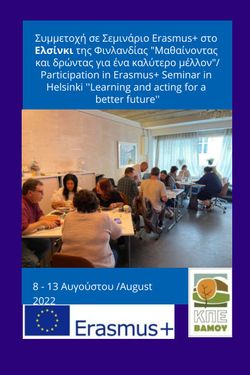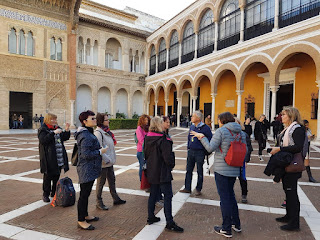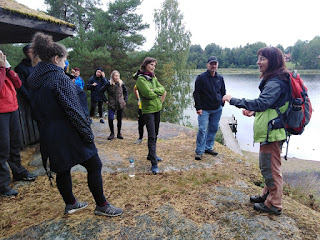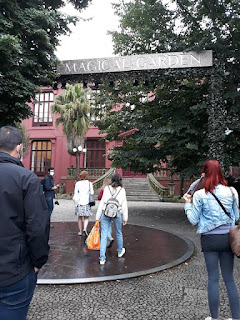
Τρίτη 8 Νοεμβρίου 2022
Τετάρτη 21 Σεπτεμβρίου 2022
Τρίτη 13 Σεπτεμβρίου 2022
PARTICIPATION IN ERASMUS+ SEMINAR IN HELSINKI ''LEARNING AND ACTING FOR A BETTER FUTURE'' 8-13 AUGUST
You may see an e-book about this, here.
In the framework of the implementation of the Erasmus+ KA1 program, "Climate Change, Refugees and Immigrants" (approval number from the State Scholarship Foundation 2020-1-EL01-KA104-078696), implemented with the partnership of the Ecological Initiative of Chania and the Environmental Education Centers of Vamos and Anogeia, the Head of the Education Center for the Environment and Sustainability of Vamos , Fotis Pontikakis, participated in an Erasmus+ Seminar in Helsinki, Finland from 8-13 August, 2022.The topic of the Seminar was "Environmental Education: Learning and acting for a better future".
The organizer
of the Seminar was Europass Teacher Academy, which organizes such seminars in
27 regions with over 12,000 participants every year.
The
objectives of the Seminar were:
• To
prepare teachers for the educational challenges posed by environmental
degradation and sustainability and to fill relevant knowledge gaps.
• To enable
teachers to communicate with their colleagues from other countries about
environmental issues.
• To
highlight the importance of teaching these subjects to young people.
• To make
the members of the educational community more environmentally friendly.
• To
present ways to engage young people in actions concerning sustainability and
the environment.
• To promote practical steps and measures that can be taken to make a school plastic free.
·
At the
beginning of the Seminar there were presentations of the participants and their
schools, and also of the Finnish education system which is considered one of
the best in the world. Other parts of the seminar included:
• A workshop
using Lego blocks in groups to visualize environmental problems and their
possible solutions.
•
Presentation and discussion about ''Fast Fashion'', the endless changes in fashion
that result in a waste of natural resources and money.
• Workshops
of Positive Pedagogy techniques, with the aim of not focusing only on the
problems, but drawing hope for action
and solutions to the problems from positive experiences .
•
Presentation of UNESCO's 17 Sustainable Development Goals.
•
Discussion of the ‘’Green washing’’ phenomenon, the advertising and promotion
of various corporate practices and activities as "green" without
proof, through vagueness and irrelevant references.
•
Discussion about learning through Problem Solving and also about Phenomenon
Learning (Learning through Phenomena/Experience).
• Technical
workshops such as ‘’ Debate’’ and «Six hats" on how to solve a problem
with a multifaceted examination.
• Various
pedagogical techniques and methods were presented and used, such as Cooperative
Learning,’’ Think-Pair-Share’’ technique, etc.
• In
addition, there was an extensive discussion about the Eco Anxiety that is
present in today's youth who are experiencing the intensifying ecological
crisis and ideas and techniques of Positive Pedagogy were presented to deal
with it through positive actions.
The two
guided tours organized as part of the Seminar were particularly interesting,
one in the center of the city of Helsinki which helped us get to know the city,
its monuments and its history, and the other to the islet of Seurasaari, which
is located on the city outskirts and is accessible by bus, followed by a wooden bridge crossing. This islet is an
open museum surrounded by greenery, with squirrels roaming around and dozens of
wooden traditional rural houses preserved as they were 100 years ago (see also
related video).
It is also worth mentioning the impressive modern central public library OODI, in the center of Helsinki, a cultural jewel that also shows the importance that Finland gives to culture and education (see a short related video). This library includes areas for isolation and study for individuals and groups, special areas for children, recording studios and video games for young people, etc.
Finally, a
lesson plan on waste was created as part of the Seminar:
LESSON PLAN
FOR WASTE
A) PURPOSE:
The purpose of this lesson plan is to inform the learners and make them aware
of the issue of waste.
B) TIME
REQUIRED: 10-12 teaching periods (1 teaching period per week).
C) LEARNING
OUTCOMES:
a)
Knowledge about the waste problem and possible solutions,
b) Problem
analysis skills, ability to recycle and reduce waste,
c)
Attitudes: Interest in the environment and willingness to take action by
reducing litter, reusing things and recycling.
D) COLLABORATION
a) Voluntary group of teachers and trainees,
b) School administration,
c) Parents,
d) Waste management unit,
e) local environmental Non-Governmental Organization
E) METHODOLOGY: Project method, problem solving method, theater game and puppet show, exploratory method
F) DEVELOPMENT STEPS / SCHEDULE
1. Initial discussion between teachers and learners – Decide on the topic
2. Definition of individual topics (sub-topics) related and creation of working groups (eg paper, organics, aluminum, soft drink cans).
3. Group planning and research – Visit to a local waste management facility, environmental NGO visit to school and discussion, paper recycling workshops, creating dolls from reusable materials.
4. Critically analyze in each group the findings and the information gathered. Creation of bins for material recycling in school premises.
5. Preparation of each group for presentation with theatrical game, puppet show, music, Powerpoint, video, comics, posters, etc.
6. Presentation in plenary or in a public event of the results of the groups' research. Discussion and evaluation of experience, feedback.
Παρασκευή 2 Σεπτεμβρίου 2022
Participation in the Erasmus+ Seminar "Cultural Heritage and Storytelling Education" in Padua, 12-16 July 2022
In the framework of the implementation of the Erasmus+ KA1 program, "Climate Change, refugees and immigrants" (approval number from the State Scholarship Foundation 2020-1-EL01-KA104-078696), the educators Konstantina Papadogiannaki, teacher, deputy head of ECV and Eleni Despotidou, architect, member of the Pedagogical Team, from the Environmental Education Center of Vamos, participated in a multi-day seminar entitled "Cultural heritage and storytelling education" in Padua, Italy from July 12th to 16th 2022.
Educators and adult trainers from Poland, Spain, Germany, the Basque Country, Hungary and Greece participated in the seminar.
The pedagogical methodology of the program was based on the combination of formal and non-formal education aiming at stimulating active participation, proactiveness, interaction and creative use of the material by all participants, while reinforcing a clear European dimension. In doing so, the goal was to create a varied and stimulating environment for reflection, work and learning. This methodology is characterized by a set of different features and tools, such as:
• appropriate balance of theory and practice
• team building and teamwork
• best practice case studies
• innovative, relevant and factual content
• horizontal and practical approach
• digital tools
• blended learning
• project based work
• practical workshop
• brainstorming
• role game
• self-assessment and group assessment.
The objectives set by this particular seminar were very interesting and coincided with those of the Pedagogical Team of the Environmental Center of Vamos for updating and enriching their resources in terms of ideas, modern strategies and tools for the development of educational programs that will aim at the inclusion of all populations and ethnicities:
1. Exploring heritage education in the context of collaborative learning, blended learning and flipped classroom.
2. Acquiring non-formal education methods and tools to promote students' exploration, study and representation of cultural heritage and the basic skill of cultural awareness and expression.
3. Promoting diverse creative languages and improving the use of ICT and digital tools for storytelling and heritage education.
4. Stimulating reflection and innovative ideas for a sustainable education in cultural heritage, in the "European Year of Cultural Heritage 2018".
Παρασκευή 8 Ιουλίου 2022
Participation in the Erasmus+ Seminar "Art for the Inclusion of Immigrants, Refugees and Disadvantaged Populations" in Florence, June 27-July 23, 2022
The Environmental Education Center of Vamos implements the Erasmus + KA1 program "Climate Change, refugees and migrants" (approval number from the State Scholarship Foundation 2020-1-EL01-KA104-078696).
In our increasingly mobile world – with environmental factors, poverty and political unrest fueling large-scale migration – communities are seeing the arrival of new populations, who face new socio-economic challenges and, at times, growing feelings of intolerance for the 'other'. "
As a result, today's classrooms accommodate students of mixed socio-cultural backgrounds (eg, local students and immigrant students who have recently arrived in the country and do not speak the language). Today's teachers have a responsibility to define and promote shared values among diverse students in the classroom and in the wider community. Therefore, strategic and accessible tools for the integration of newly arrived immigrant students must be found to promote intercultural dialogue and understanding.
With this program, the Environmental Education Center acquires ideas and tools for the development of educational programs aimed at the inclusion of all populations and ethnicities, using modern strategies and the universal language of art, as tools of intercultural education.
As part of this program, Adriana Basiou, (English teacher, member of the pedagogical team) participated in a multi-day seminar (Structured Course) on "Art for the Inclusion of Immigrants, Refugees and Disadvantaged Populations" in Florence, Italy, during the period 27 June-July 2, 2022.
The seminar was organized by the Europass Teacher Academy.
Europass is an organization with more than 200 partners and 200 courses available every year.Its seminars are geared towards innovation, well-being, the arts and an improved school environment, with a firm focus on 21st century skills and fostering professional connections between educators of diverse experiences and backgrounds, encouraging meaningful collaboration and fruitful exchanges while keeping educators informed, adaptive and motivated as they constantly face unprecedented challenges
The seminar was attended by teachers and professors from Spain, Ireland, Germany, Portugal, Holland and Greece.
During the seminar, teachers were presented with strategies for the inclusion of people living on the margins of society through the universal language of art. Teachers learned how to use art as an accessible tool to integrate newly arrived immigrant students into their classrooms and to promote intercultural dialogue and understanding.
The residual effects of trauma and displacement were analyzed, teachers discussed the health benefits of art making, and reviewed international art initiatives currently working to integrate minorities and rebuild communities after a crisis.
In addition, collaborative art forms, which require limited resources, were practiced from visual installation to performance (eg using found objects to tell a story, practicing non-verbal forms of communication). Through artistic expression, the main goal was to overcome language and cultural barriers and work towards a better understanding of each other.
Teachers interacted with each other, experimented with different art forms accessible to people of different cultural backgrounds and abilities – including immigrants, migrants and refugees, and practiced strategies to encourage moral and emotional reflection and creative collaboration among students. In addition, they exchanged project ideas and teaching tools with other education professionals to develop more effective and inclusive creative arts curricula and related this year's World Migration Report to their own teaching environments.
Πέμπτη 24 Φεβρουαρίου 2022
Erasmus KA1 project: Nature and Culture as tools for intercultural education
Europe faces a wave of xenophobia and racism,
that worsens with the compulsory migration of many people or refugees because
of Climate Change and war conflicts. So there is a need for intercultural education
to promote peaceful co-existence of different people. The protection of nature and
cultural heritage can be important tools in this effort. Monuments of nature
and culture are a common heritage for humanity, necessary for our survival,
physical and cultural as well. Biodiversity and cultural diversity can be tools
for mutual respect and understanding of different people who are called to
co-exist in new circumstances after wars and natural disasters.
In the context of this projects, members of the Pedagogical Team of Vamos Environmental Education Centre participated in Courses in Tenerife (“Time for Action: Non formal education through indoor and outdoor teaching methods for empowering students’ participation” organized by New Horizons Malta), in Seville ("Other shores" organized by Chain Foundation) in Spain, in Porto ("There is no planet B" organized by Learning Together) in Portugal, in Brokind in Sweden (“Nature as a Fantastic Classroom" organized by Outdoored.eu).
With this project our Centre integrated ideas and tools and created educational programs (Learning Scenarios) outdoors or in a classroom about the use of nature and cultural heritage as tools for intercultural education. Additionally, short informing videoclips were created.






















